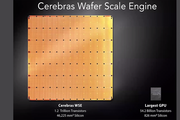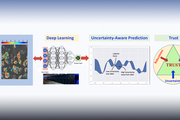Did you know we have a monthly newsletter? View past volumes and subscribe.
Defending U.S. critical infrastructure from nation-state cyberattacks
July 21, 2022 -
For many years, LLNL has been conducting research on cybersecurity, as well as defending its systems and networks from cyberattacks. The Lab has developed an array of capabilities to detect and defend against cyberintruders targeting IT networks and worked with government agencies and private-sector partners to share its cybersecurity knowledge to the wider cyberdefense community. LLNL has...
Assured and robust…or bust
June 30, 2022 -
The consequences of a machine learning (ML) error that presents irrelevant advertisements to a group of social media users may seem relatively minor. However, this opacity, combined with the fact that ML systems are nascent and imperfect, makes trusting their accuracy difficult in mission-critical situations, such as recognizing life-or-death risks to military personnel or advancing materials...
CASC team wins best paper at visualization symposium
May 25, 2022 -
A research team from LLNL’s Center for Applied Scientific Computing won Best Paper at the 15th IEEE Pacific Visualization Symposium (PacificVis), which was held virtually on April 11–14. Computer scientists Harsh Bhatia, Peer-Timo Bremer, and Peter Lindstrom collaborated with University of Utah colleagues Duong Hoang, Nate Morrical, and Valerio Pascucci on “AMM: Adaptive Multilinear Meshes.”...
Unprecedented multiscale model of protein behavior linked to cancer-causing mutations
Jan. 10, 2022 -
LLNL researchers and a multi-institutional team have developed a highly detailed, machine learning–backed multiscale model revealing the importance of lipids to the signaling dynamics of RAS, a family of proteins whose mutations are linked to numerous cancers. Published by the Proceedings of the National Academy of Sciences, the paper details the methodology behind the Multiscale Machine...
LLNL establishes AI Innovation Incubator to advance artificial intelligence for applied science
Dec. 20, 2021 -
LLNL has established the AI Innovation Incubator (AI3), a collaborative hub aimed at uniting experts in artificial intelligence (AI) from LLNL, industry and academia to advance AI for large-scale scientific and commercial applications. LLNL has entered into a new memoranda of understanding with Google, IBM and NVIDIA, with plans to use the incubator to facilitate discussions and form future...
Building confidence in materials modeling using statistics
Oct. 31, 2021 -
LLNL statisticians, computational modelers, and materials scientists have been developing a statistical framework for researchers to better assess the relationship between model uncertainties and experimental data. The Livermore-developed statistical framework is intended to assess sources of uncertainty in strength model input, recommend new experiments to reduce those sources of uncertainty...
Summer scholar develops data-driven approaches to key NIF diagnostics
Oct. 20, 2021 -
Su-Ann Chong's summer project, “A Data-Driven Approach Towards NIF Neutron Time-of-Flight Diagnostics Using Machine Learning and Bayesian Inference,” is aimed at presenting a different take on nToF diagnostics. Neutron time-of-flight diagnostics are an essential tool to diagnose the implosion dynamics of inertial confinement fusion experiments at NIF, the world’s largest and most energetic...
Laser-driven ion acceleration with deep learning
May 25, 2021 -
While advances in machine learning over the past decade have made significant impacts in applications such as image classification, natural language processing and pattern recognition, scientific endeavors have only just begun to leverage this technology. This is most notable in processing large quantities of data from experiments. Research conducted at LLNL is the first to apply neural...
The data-driven future of extreme physics
May 19, 2021 -
By applying modern machine learning and data science methods to “extreme” plasma physics, researchers can gain insight into our universe and find clues about creating a limitless amount of energy. In a recent perspective published in Nature, LLNL scientists and international collaborators outline key challenges and future directions in using machine learning and other data-driven techniques...
Ana Kupresanin featured in FOE alumni spotlight
March 10, 2021 -
LLNL's Ana Kupresanin, deputy director of the Center for Applied Scientific Computing and member of the Data Science Institute council, was recently featured in a Frontiers of Engineering (FOE) alumni spotlight. Kupresanin develops statistical and machine learning models that incorporate real-world variability and probabilistic behavior to quantify uncertainties in engineering and physics...
Lab researchers explore ‘learn-by-calibration’ approach to deep learning to accurately emulate scientific process
Feb. 10, 2021 -
An LLNL team has developed a “Learn-by-Calibrating” method for creating powerful scientific emulators that could be used as proxies for far more computationally intensive simulators. Researchers found the approach results in high-quality predictive models that are closer to real-world data and better calibrated than previous state-of-the-art methods. The LbC approach is based on interval...
CASC research in machine learning robustness debuts at AAAI conference
Feb. 10, 2021 -
LLNL’s Center for Applied Scientific Computing (CASC) has steadily grown its reputation in the artificial intelligence (AI)/machine learning (ML) community—a trend continued by three papers accepted at the 35th AAAI Conference on Artificial Intelligence, held virtually on February 2–9, 2021. Computer scientists Jayaraman Thiagarajan, Rushil Anirudh, Bhavya Kailkhura, and Peer-Timo Bremer led...
DOE announces five new energy projects at LLNL
Nov. 13, 2020 -
The DOE today announced two rounds of awards for the High Performance Computing for Energy Innovation Program HPC4EI), including five projects at LLNL. HPC4EI connects industry with the computational resources and expertise of the DOE national laboratories to solve challenges in manufacturing, accelerate discovery and adoption of new materials and improve energy efficiency. The awards were...
What put LLNL at the center of U.S. supercomputing in 2020?
Nov. 12, 2020 -
The HPC world is waiting for the next series of transitions to far larger machines with exascale capabilities. By this time next year, the bi-annual ranking of the Top500 most powerful systems will be refreshed at the top as Frontier, El Capitan, Aurora, and other DOE systems come online. While LLNL was already planning around AI acceleration for its cognitive simulation aims and had a number...
AI gets a boost via LLNL, SambaNova collaboration
Oct. 20, 2020 -
LLNL has installed a state-of-the-art artificial intelligence (AI) accelerator from SambaNova Systems, the National Nuclear Security Administration (NNSA) announced today, allowing researchers to more effectively combine AI and machine learning (ML) with complex scientific workloads. LLNL has begun integrating the new AI hardware, SambaNova Systems DataScale™, into the NNSA’s Corona...
LLNL, ANL and GSK provide early glimpse into Cerebras AI system performance
Oct. 13, 2020 -
AI chip and systems startup Cerebras was one of many AI companies showcased at the AI Hardware Summit which concluded last week. Cerebras invited collaborators from LLNL, Argonne National Laboratory, and GlaxoSmithKline to talk about their early work on Cerebras machines and future plans. Livermore Computing's CTO Bronis de Supinski said, “We have this vision for performing cognitive...
Machine learning speeds up and enhances physics calculations
Oct. 1, 2020 -
Interpreting data from NIF’s cutting-edge high energy density science experiments relies on physics calculations that are so complex they can challenge LLNL supercomputers, which stand among the best in the world. A collaboration between LLNL and French researchers found a novel way to incorporate machine learning and neural networks to significantly speed up inertial confinement fusion...
LLNL papers accepted into prestigious conference
July 9, 2020 -
Two papers featuring LLNL scientists were accepted in the 2020 International Conference on Machine Learning (ICML), one of the world’s premier conferences of its kind. Read more at LLNL News.
DL-based surrogate models outperform simulators and could hasten scientific discoveries
June 17, 2020 -
Surrogate models supported by neural networks can perform as well, and in some ways better, than computationally expensive simulators and could lead to new insights in complicated physics problems such as inertial confinement fusion (ICF), LLNL scientists reported. Read more at LLNL News.
Modeling neuronal cultures on 'brain-on-a-chip' devices
June 12, 2020 -
For the past several years, LLNL scientists and engineers have made significant progress in development of a three-dimensional “brain-on-a-chip” device capable of recording neural activity of human brain cell cultures grown outside the body. The team has developed a statistical model for analyzing the structures of neuronal networks that form among brain cells seeded on in vitro brain-on-a...























